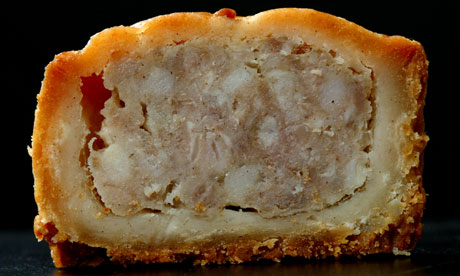
What does British food tell us about how we live today? That's the question food writer Simon Majumdar gives as his excuse for driving around the country gorging himself on eccles cakes and pork pies in order to write this memoir, a follow-up to his last culinary travelogue Eat My Globe.
There are a few pages dedicated to wrangling with that topic: immigration was the engine behind many of our most traditional dishes, industrialisation changed mealtimes, and wartime rationing had long-lasting consequences, Majumdar writes, but his strength isn't in digging through archives. Instead, the bulk of Eating for Britain's almost 400 pages are written in a style familiar to readers of Dos Hermanos, the blog run by Majumdar and his brother Robin. It's a style that's personal, enthusiastic and very certain about what's good (strong builders' tea and anything involving large quantities of meat) and what's suspect (men baking cakes, TV chefs, "the health brigade"), and which involves long reminiscences about the author's favourite greasy spoon or the way his grandmother made welsh faggots.
The candidates given for a perfect British meal are, for the most part, unsurprisingly old-school – roast beef, kippers, fish and chips, pork pies, eels, steak and kidney pudding – although there's a couple of nods to multiculturalism. Chicken tikka masala, said to have originated in Glasgow, and balti from Birmingham get a mention, and there are plenty of regional favourites included, like the arbroath smokie, yorkshire parkin and eccles cakes.
It turns out that many of these have their origins outside Britain. Fish and chips, we're told, originated with refugees from Spain and Portugal who covered fish in flour, and Huguenots who fried potatoes in fat. Jellied eels eaten in London have been caught in the Netherlands, not the Thames, since the late 1800s, and smoked salmon is credited to eastern European Jews.
In each chapter Majumdar tries the best examples of each foodstuff in their places of origin, sometimes has a go at making them, and often ends up lamenting the decline of independent regional suppliers. The most interesting sections, such as the ones on ferreting, hunting and crabbing, involve some action, and they all leave you wishing you had something more than a bit of toast to keep you going as you turn the pages. Even readers who aren't fans of Majumdar's cheery, blunt style should be inspired to start browsing recipes.

